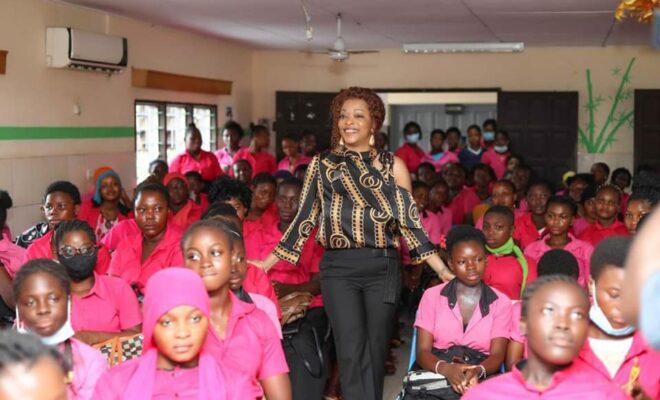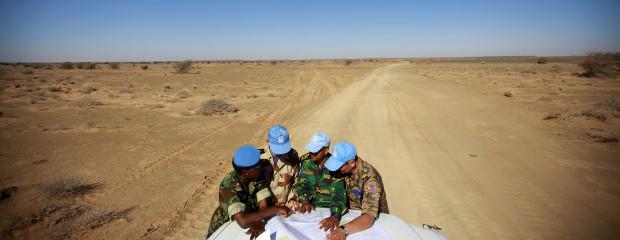The jailed candidate: What Madougou’s case tells us about Benin

It’s time to wake up and realise that Benin is no longer the model democracy it once was. Political, legal and social rights have all been eroded.

Former minister and presidential candidate Reckya Madougou on a visit to a school in December 2020. Credit: Reckya Madougou/Facebook.
For almost eight months now, Benin’s former presidential candidate Reckya Madougou has been detained just outside the capital Porto-Novo. Arrested just weeks before the April 2021 presidential election, no date has been set for her trial and the conditions of her detention are in clear contravention of Beninese and international law.
Prior to her arrest on 3 March, Madougou had been a prominent opposition figure, seeking to run as a candidate for the Les Démocrates party. Under President Patrice Talon’s predecessor Boni Yayi, Madougou had served as Minister of Microfinance, Youth & Women’s Employment, and subsequently as Minister of Justice.
Now, in the high-security prison of Akpro-Missérété, she is subjected to psychological torture from prison guards, deprived of the right to visits from her lawyers and two young children, and kept in a state of near-total isolation. Since a hearing in July 2021, no further dates have been set for further court appearances.
When viewed alongside President Talon’s attacks on democratic institutions and the press, and the lack of evidence to support the accusations, Madougou’s detention is an obvious example of a judicial system being used for political ends.
Five years of backsliding
Rather than becoming the country’s first ever female presidential candidate, Madougou has been used by the authorities to seed fear amongst civil society and the opposition, who have been critical of the direction taken by Talon in the five years since his election. One of the president’s primary targets has been the voting system. A 2019 law made it a requirement that all candidates be pre-approved by 10% of existing elected officials, effectively barring representatives from opposition parties. All of the 83 seats in Benin’s National Assembly are held by members of Talon’s party, or affiliated groups.
The effect in April 2021 was unsurprising: Talon was re-elected with 86% of the vote. The official turnout was 50%, but civil society organisations calculated it to be much lower at 26%. Observers reported citizens being barred from voting sites, the intimidation of election observers, and direct cases of vote fraud.
Madougou is not the only casualty of the decline of Benin’s democracy. Joël Aïvo, a legal academic who has been highly critical of Talon’s policies, has faced a similar fate: fabricated charges, unfair conditions, and no timeline for release despite a demonstrable lack of evidence.
The court where Madougou and Aïvo’s cases are being heard is supposedly responsible for prosecuting Economic Offenses and Terrorism. However, since its creation in 2018, the court’s primary targets have been political opponents. Sébastien Ajavon, who ran against Talon in 2016, has twice been convicted by the court and is now living in exile in France. As is one of its former judges, Essowé Batamoussi, who has condemned the political pressure under which the court operated, saying no decisions were made independent of government influence.
Beyond interference in the judicial and constitutional systems, media freedoms have also been squeezed by Talon’s government. Benin’s ranking in Reporters without Borders’ World Press Freedom Index has fallen from 79th in 2013 to 114th in 2021.
A clear signal is needed
In the months following Madougou’s arrest, regional leaders voiced their concerns. Togo, where Madougou was an advisor to President Faure Gnassingbé before her return to Benin earlier this year, was particularly vocal. However, momentum since then has been lost and international attention has waned. Meanwhile, Madougou remains in inhumane detention conditions, deprived of her rights.
One recourse which should have been open to Madougou and her legal team is the African Court on Human and Peoples’ Rights. However, Benin withdrew from the court in April 2020, making it impossible for NGOs and individuals to refer cases. Despite this, the court should use its influence on remaining member states and fellow human rights courts across the world to support exiles and political prisoners like Madougou.
Madougou’s lawyers have submitted a referral file to the UN’s Working Group on Arbitrary Detention, whose mandate is to “investigate cases of deprivation of liberty imposed arbitrarily or inconsistently with the international standards”. In addition to outlining the facts of the case, her lawyers are demanding her immediate release and reparations. In all ways – from the deprivation of rights to the rejection of a request for provisional release due to a lack of evidence – Madougou’s detention is arbitrary and must be declared as such.
It is time for Benin’s partners across the world to wake up and realise that Benin is no longer the model democracy it once was. Providing support and judicial protection to Madougou – and all those who suffer oppression – would send a clear signal that such injustices will not be tolerated. A decisive international response would send a signal to Benin’s government that these actions will not be tolerated and could provoke genuine change in a country that, until recently, had strong and resilient democratic institutions. Despite the assaults on the judiciary, constitution and press freedoms, we remain hopeful for the possibility of change – starting with the release of Reckya Madougou.





